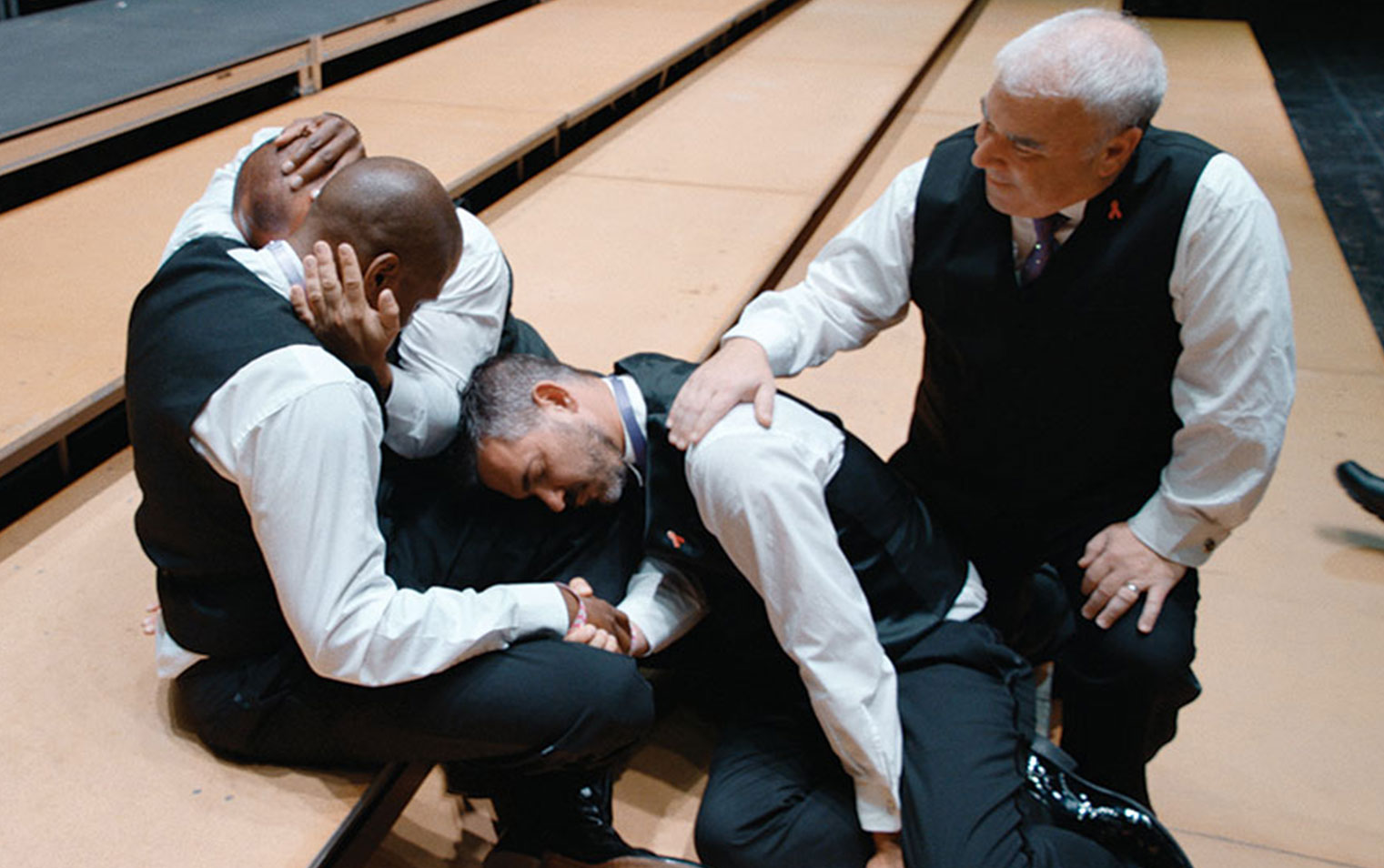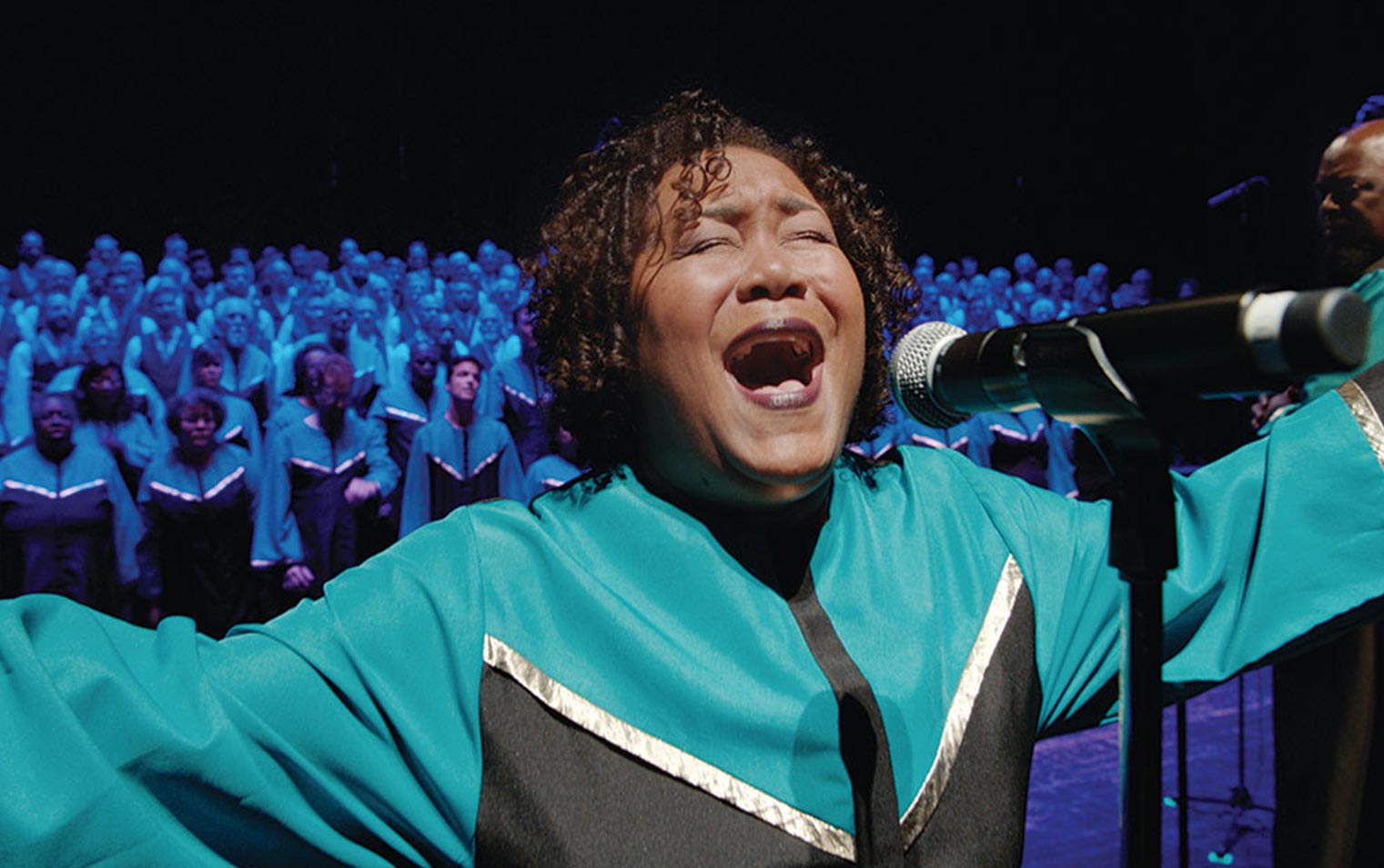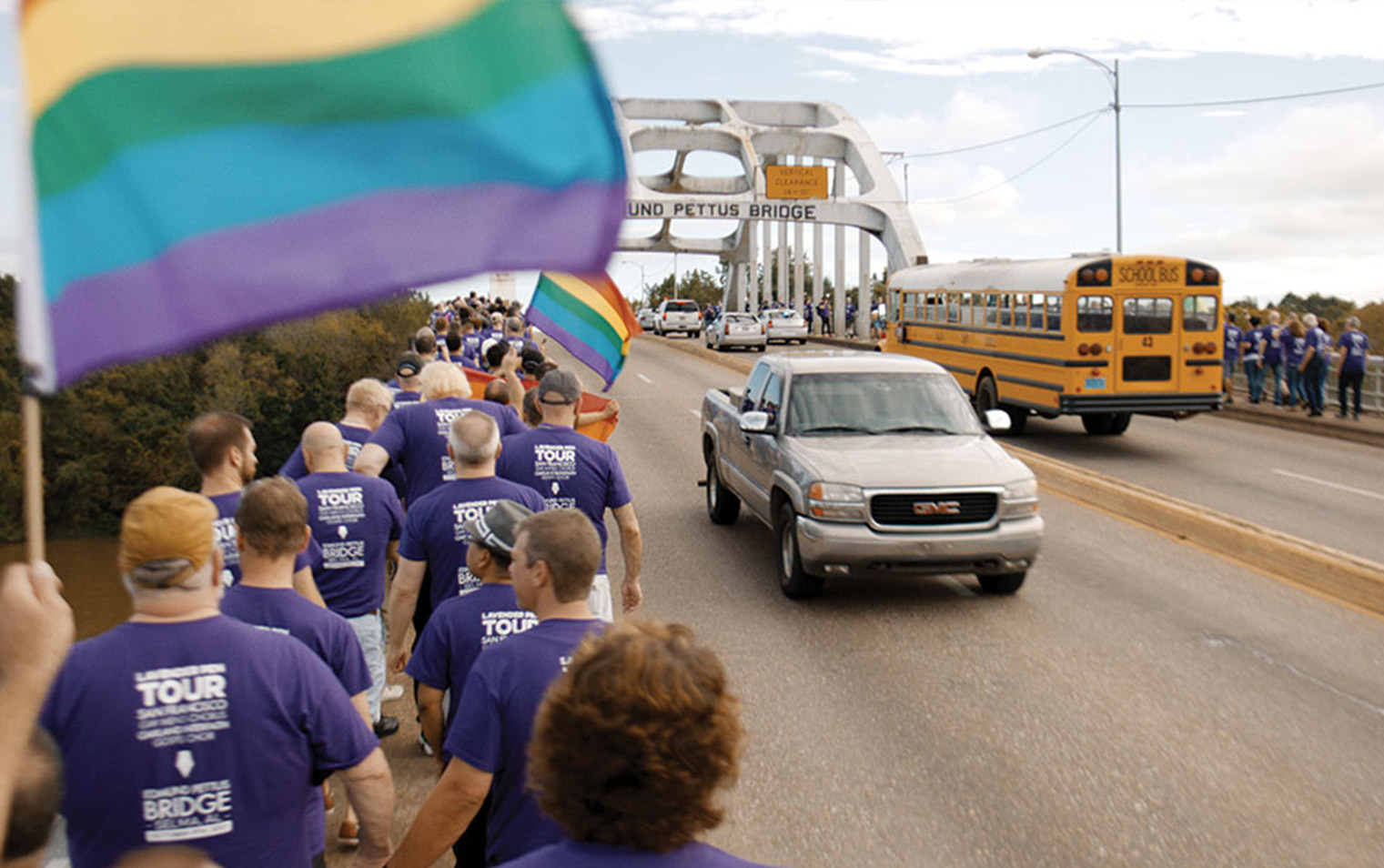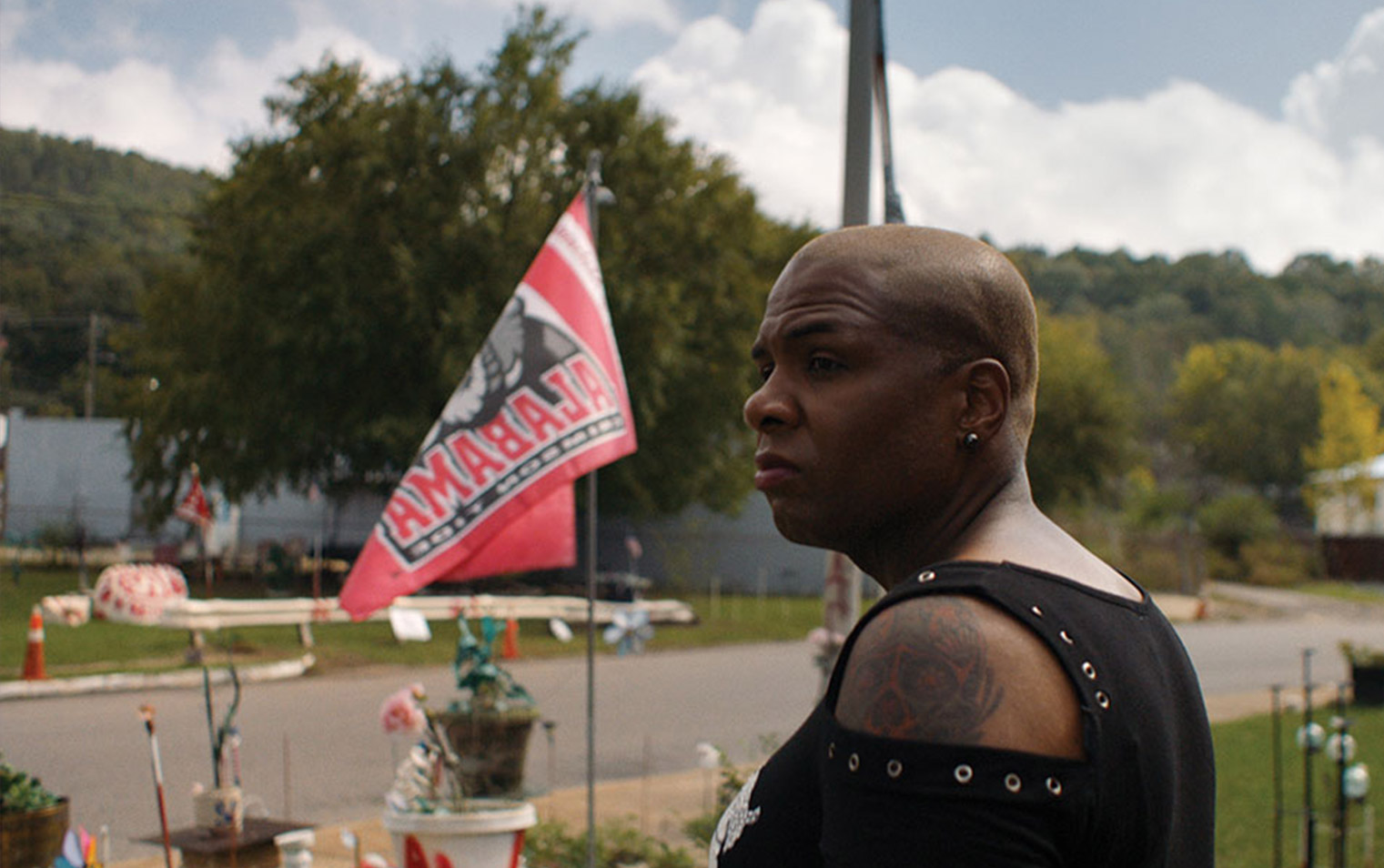
Born in Boston but raised in Brazil, activist, ad man, and director David Charles Rodrigues has never felt completely steeped in any one culture or community.
His debut documentary, Gay Chorus, Deep South, hasn’t had that problem. It's been accepted into festivals around the world and has already taken home a slew of audience awards since its premiere at Tribeca this spring. The documentary follows the San Francisco Gay Men’s Chorus as it sings its way across the five states with the most discriminatory laws against the LGBTQIA community: Mississippi, Tennessee, the Carolinas, and Alabama. The palpable rift that the 2016 election elicited nationwide, along with a wave of anti-LGBTQIA laws in the South, inspired the chorus’s journey, with members hoping they could use music to connect with people most fired up against them — and they were right.
Gay Chorus, Deep South paints a picture of a world where tolerance is possible, which is what drew Rodrigues to the story. Neither gay nor Southern, Rodrigues still found a very personal connection to the narrative and drew on his life-long sense of otherness to tell a universal story. The authenticity of his pitch won him the support of the chorus over more well-established filmmakers also vying to tell its story.
Rodrigues, now based in Los Angeles, came up through the advertising world and has created massive campaigns such as Vote Your Future, which included short films directed by Alejandro Innaritu, David O. Russell, and Joss Whedon. Given his background, it’s not entirely surprising that Rodrigues was the first person to have a feature film funded by Airbnb. He was consulting for the company when he happened upon the story of the chorus’s upcoming tour. He knew Airbnb was looking to invest in a film that aligned with the company’s ethos and immediately honed in on the story. It wasn’t a tough sell for Airbnb, which quickly came on board.
Rodrigues is an inspiring filmmaker for this moment in time because he wants to tell stories with a purpose but also understands the business side of things. He hopes that his collaboration with Airbnb can inspire other companies to take a similar step and put their money towards telling important stories. As a filmmaker myself, I was lucky enough to get him on the phone to talk about topics important to filmmakers: how to find the story, how to sustain a career as a filmmaker, and the inspiration he found in his subjects’ journey toward acceptance and belonging. He asked me not to use anything against him, but as you’ll read, there wouldn’t be much if I tried.
Sophie Finkelstein: How did you find this particular story?
David Charles Rodrigues: I was really upset about the elections, more so than normal because I had worked so hard on the voter registration campaign, and then what shook me wasn’t really about who was elected; it was about the division created in the country. I was, like, "Is this division even real? Or is this something that social media and the media are creating so we can hate each other and they can take greater control of the population?” I was trying to think of ideas and stories that could help prove that or bridge this divide. [My wife] read about the San Francisco Gay Men's Chorus touring the Deep South. When she told me the story, I was, like, That's it! That is the one way that we can help show people that it's possible to have different opinions and come from different places and still have unity.
Sophie: When you found the idea, did you reach out to the chorus or Airbnb first?
David Charles: I was already working within Airbnb on another project with this producer, and I told him about it, and we got super excited. I put a pitch together, and they got excited, and then we reached out to the chorus. There were actually two other filmmakers and production companies — way more established than us bidding to tell the story.
Sophie: What do you think your edge was?
David Charles: From the very beginning, we said we wanted to make a film about people coming together. It wasn't a film about the tour, it wasn't a film about the chorus, it was really leveraging that epic story to show the many dimensions of humanity that can come from it.
Sophie: Not being a gay man, what personally connected you to the story?
David Charles: Because I've been the outcast my entire life. I was born in Boston, grew up in Brazil. In America, I'm Brazilian; in Brazil, I'm American. I never belonged anywhere, you know? And hearing these people's stories and their coming out stories, it's all about trying to find belonging and acceptance. It's something that I'm still looking for, and I found it in spending time with them. When you go through those things in life, you just become so strong and focused on what matters in life, which is unconditional love and caring for each other. All the other bullshit just falls through, like having a new car or getting a raise. Once you go through something so profound like coming out or finding acceptance and being your true self, those other things matter less.

Still from Gay Chorus, Deep South
Sophie: You’ve been an activist for many years. Did that affect how you chose to tell this story?
David Charles: I try to have a meaningful message in everything I do. We're living in an era, especially after 2016, that everything we do has to be towards creating a better world for our kids and for ourselves. No matter what you do, it has to come with that message, whether it's my choice in working with companies like Impossible Foods, who are trying to create the plant-based burger to overturn global warming, to trying to make this film. Change has to come from within, so working with big corporations and big brands and having them drive this message is just a new way of activism. I don't go out in the streets and hold up a sign and scream; mostly my form of activism is working closely with corporations and helping them deliver meaningful messages into society, even restructuring how they work so they can connect better to a world that's more sustainable.
Sophie: Tell me about your trajectory from advertising and activism to directing your first feature.
David Charles: In a weird way, it's full circle for me because I started out as a comic book writer in Brazil at sixteen but always wanted to make films. I came from a lower middle-class family, and the only industry you could be creative and make a living — if you didn’t have rich parents — is in advertising. So, I migrated into advertising, and I worked really hard and had some very early success. I worked in Brazil for the first four years and then migrated to California to work in San Francisco. When I was there, that was kind of the beginning of digital video — around 2006, 2007 — when brands really started making stuff. But the budgets were still very low, so as the writer and creative director of the agency, I ended up directing my own things. That kicked off my directing career, but I spend my time split between both worlds: developing my filmmaking career but still connected to advertising to make it sustainable.
“Change has to come from within, so working with big corporations and big brands and having them drive this message is just a new way of activism.”
Sophie: It seems that advertising and branded content are the way to make a directing career sustainable these days — and you’ve figured it out!
David Charles: It's very challenging. When this film happened, I had been consulting with Airbnb for a year. When I heard the story, I knew they had a curiosity [for] original content, and I pitched it to them. Airbnb was more than a financier. They didn't just sign a check and say, "Hey, go do it." They entrusted us, they produced it with me, and they continue to support the film. I worked closely with my producer, Bud Johnston, an Airbnb employee, and Adam Hobbs, an Airbnb director of photography. They’re both so talented and amazing that we were able to create this little tight unit, and we made a film together.
Sophie: To clarify, this isn’t a branded doc even though Airbnb paid for it, right?
David: They paid for it and produced it with Airbnb employees, but at no moment was [there] a question [of] any brand integration. Zero. It was developed and produced and made and realized as if Impact Partners was funding it or Participant Media. Exact same process.
Sophie: Was it just you, Bud, and Adam while you were on the road?
David: We also had Freddie Whitman, an AC, so during the majority of the production, it was us four. We had help [from] Jesse Moss, our creative producer [and] an established, award-winning filmmaker who we brought on board to oversee us. James Goode and Tony Högqvist were the executive producers, and they helped us maintain the investment but also the purity in the filmmaking, keeping us away from the branding side of things. During the tour, there were ten of us. We had a second unit. We hired an outside DP and AC and sound person. Two sound people. But the majority of the film was made by four people.
Sophie: What was your production schedule?
David: We had, like, fifty to sixty shoot days within a six-month timeline and then a year of post. The tour was in October 2017. We went to the South two times before that, and then we did the tour and went back to the South one more time during edit to get some pick-up stuff and b-roll. This film is not about the San Francisco Gay Men's Chorus. This film is about these worlds coming together. To represent the South and give the South its own voice is very important, so that's where we spent most of our time and energy.
Sophie: Was anyone Southern on that crew?
David: Our DP is from North Carolina. And then we have a sound guy from the South.
Sophie: Did they bring different perspectives on what you were seeing?
David: Where we actually learned a lot was from the featured chorus members because a lot of them came from the South. They really helped educate us into understanding the nuances, veneer, and myth behind the Southern hospitality.

Still from Gay Chorus, Deep South
Sophie: What do you recommend for gaining the trust of your subjects?
David: Having a point of view and being straightforward and open about the story you want to tell. It's not just imposing your thoughts onto them. It's really hearing them and building onto those thoughts. It becomes a collaboration.
Sophie: Did you spend time with the characters without your cameras first?
David: Yes. It sucks because sometimes you get gold and you're, like, "Fuck." But it's very important — not too much time, though, just enough to get them comfortable. If you're only with them for a day, maybe the first half an hour, hour. But if you're with them for a week, then a day.
Sophie: Often the first time you speak to someone is when they say the most powerful, open things. If you ask them to say it again, it's just doesn't work.
David: You just have to ask them a different question that's kind of the same so they say the same thing again in a different way.
Sophie: Interesting. You never ask them to repeat stuff? You just ask from a different angle?
David: Yeah, I'll never ask them to repeat anything unless it's an incredible person who is used to being on camera, but that's rare.
Sophie: Do you still have a relationship with your subjects?
David: Oh, yeah, they're family. We were just in Zurich at the film festival and having dinner every day, going to the spa together. It's just the most beautiful thing. Hopefully, that will repeat again, but it's really a dream come true, and when we finished the edit, it almost broke my heart that I had to move away from that world because it was so special and precious to me.
Sophie: Did you have moments where you would record things that were important to the story and then subjects would ask you not to use it?
David: We would cross that bridge when it came. Just let it flow, and if you absolutely need it in the edit, then you can have that conversation afterwards. It's a whole different conversation, especially when you show it in context. It makes those decisions way easier.
Sophie: Did you show the film to your subjects before finishing it?
David: In a rough cut stage, yeah.
Sophie: But did they ever see the footage or ask to see the footage while you were shooting?
David: Nope. I wouldn't show it either. It's about creating this safe environment. Our shoots are never stressful; everything's okay. If there's issues, we'll solve them without giving the appearance of being stressed. It's almost like going to a friend’s for dinner. You have to have that vibe always.
Sophie: Were you with the characters all day every day? Did they have any privacy?
David: Yeah, they had privacy. We were open for serendipity and surprises, but everything was very well planned and well executed. It wasn’t just that we were following people around with a camera, waiting for things to happen. We knew the moments we wanted to capture, and we structured the film in a way that made it possible because we didn't have money to do that. It's a huge luxury. We would need, like, six cameras to follow people and then see what happened and then find the story in edit. We found this story way before edit. We were very precise in how we followed our subjects. It didn't always pan out, but sometimes it panned out even better.
Sophie: Coming from an advertising and narrative background, where you have to precisely plan, how did you navigate what you couldn’t plan?
David: That's where my Brazilian side came in. In Brazil, you're taught from very young to just take situations head on and dodge bullets and run away from people trying to rob you on the streets. I'm not kidding. The street smarts that I acquired from growing up in Brazil prepared me.
Sophie: A lot of filmmaking has nothing to do with knowing how to make a film. It’s just about intuition.
David: Yeah, 100 percent. And — don't teach it to your kid — but never ask for permission. Always ask for forgiveness. Not in a disrespectful way; just where you get what you need for your story. Try to be as thoughtful as possible but never lose your eye on the prize. Another important thing: Never get buried in details; always go back to the core message. There [were] so many details and so many other smaller things during the tour. If we got buried in those, we would have just got paralyzed.
“The biggest resistance wasn't even about being with the gay chorus; it was actually being from California. Because they just hate how California and films portray them.”
Sophie: How did your producers deal with the legal aspects of forgiveness over permission? Were you telling people who you were and what you were doing before or after?
David: There were no legal ramifications or at least not yet. We were just honest about our intentions. We weren't always up front about a gay chorus being with us, but our intention was always about giving a voice to the South and to being true to who they were. People got that when they met us. The biggest resistance wasn't even about being with the gay chorus; it was actually being from California. Because they just hate how California and films portray them. They feel wrongfully portrayed, like they're typecast, like they're treated as this mythical land, and we got that. I'm sure we got lucky at times too, but we really just spent enough time with them to prove that we were going to be honest to their point of view, and we were.

Still from Gay Chorus, Deep South
Sophie: I’m sure you met people all along the way who are fascinating. How did you keep yourself streamlined?
David: We shot over 300 hours of footage, so we talked to a lot of people that didn't make the cut. But that also helped inform the people that did. It's all part of the process. The story is about these two worlds coming together. If it wasn't about that, then it shouldn't be filmed.
Sophie: How did you decide what each of the units followed, and did you, as the director, hop between the two?
David: We had several characters that we had to follow, and every morning I would gather both units and decide who would follow who. Jesse Moss would help lead the second unit because he worked a lot with the DP we brought on board, Thorsten Thielow, an incredible, established documentary DP. I would work with my unit and then we would come together at the end of the day for the concerts and work together. That was the rhythm of each day.
Sophie: Did you write a script for it?
David: I didn't, but I created a structure and story arcs for the characters. All of that is important to create some sort of point of view. We didn't dictate anything, we didn't force anything, everything happened naturally. It's just more of a guideline to know what we're doing and to help our decisions.
Sophie: Were you the one who edited the film?
David: No, it was edited by Jeff Gilbert. This is his tenth or eleventh film. He did The Overnighters, which is incredible. It won a prize at Sundance, and he did the The Rachel Divide recently, which was very controversial. We worked very closely for a year, and the most special part about making this film was that everyone became family. You see Tarantino and Wes Anderson and all these people, and they work with the same people over and over and over again. I've finally found my people, and it's my dream and goal to make sure that that continues.
Sophie: An editor is a really hard person to pick for a film. How did you pick Jeff?
David: He's very, very strong with story. It's story first for him and aesthetic second. And I just really liked him off the bat. He worked a lot with Jesse, our producer, and Jesse trusted him as well. It helps having that relationship, but it's really important that you get along with the person. That's number one. Similar to me, he's straight and didn't even like choral music. I thought, "Wow, he's going to have to cut something that he loves. So, if he can love something that he doesn't like, everyone will love it." That was my instinctive gamble, and luckily it paid off. Now we will go to every single Gay Men's Chorus performance for the rest of our lives. We just love it, and we had to convince ourselves that it was special before convincing other people.
Sophie: What's it been like being with a film that’s attuned to today’s divisions? Do you have something to compare it to?
David: I have nothing to compare it to. The most incredible thing about the film so far . . . I mean, we won the audience award at Tribeca, we won the audience award at Zurich, and we just won the audience award at Northwest Fest in Edmonton, the oldest documentary film festival in Canada. Tribeca is Tribeca, and in Zurich, it was a gay festival, and then in Canada, it was a doc festival. So, these are three completely different audiences, and that's what's really special. We've been very fortunate — with a few exceptions, of course, because there always are — that the reviews have been really on point as well with our message.
Sophie: Did you anticipate that it would be celebrated by such diverse audiences?
David: It was just natural. The story was already universal. I'm a straight, Latino guy, and most of our crew were straight as well. That has nothing to do with it, but I'm just saying that it wasn't an insider look. It was really about showing all the facets of humanity and about celebrating the Other. There are so many Others in the world, and the LGBTQ community is such a beautiful, loving, and strong and organized community. They are the best-case scenario of how we can organize ourselves, how other minority groups can organize themselves to fight the oppression that's happening right now.
Sophie: Have you gotten pushback from people who don’t agree with your message?
David: Ironically, the only pushback we've had so far was from a gay chorus in the South who was upset that they weren't shown in the film. We didn't know them, and the film's not even about that. They said they were going to boycott the film without even seeing the film, and then we screened the film for them and now everything's okay. That's the irony.
Sophie: Have you had any blowback from being a straight person directing this film?
David: Not yet. When [audiences] see the film, they see the authenticity in it, so it's different than, like, Green Book, where it's clearly directed by a white person. It's the point of view of a white person when you have the most profound character — a black person — but they choose to tell it from the point of view of a white person. For the LGBT community, it's a value to have someone who's an ally and who can understand and love that community as much as we did making this film. I was nervous about it, to be totally honest. I'm sure there will be pushback at some point, but so far it's been amazing. I think it really means a lot to them to be that loved and that embraced by someone who's not a part of their community. But I am now part of that community. My sexual orientation may be different, but I tell people I have a queer mindset. Like Hecklina, who is the most [famous] drag queen of San Francisco, was the hostess at our wedding. We've always been closely connected with that community. I'd rather go to a gay bar than a sports bar, so it's just a natural thing.
“Just because Ryan Coogler is a black director, does he have to direct just Black Panther? . . . We're still typecasting, and we're at a point where that can evolve.”
Sophie: When it comes to telling someone else’s story, when do you see it as overstepping and taking that space from someone else? And when are you just someone telling a story about a group you'd like to be an ally to?
David: It depends. The step that was taken was necessary, of really letting the people within those communities tell those stories. There's so many voices that need to be heard and so many incredible filmmakers that weren't getting a chance because of their background, including myself. It's time that that moment transcends. Just because Ryan Coogler is a black director, does he have to direct just Black Panther? Why can't he direct The Avengers? We're still typecasting, and we're at a point where that can evolve. I feel like culture is beautiful when it's multicultural. And multicultural means we can share and tell each other's stories, always keeping in mind that we have to give a voice to the people that are living those stories. But that can be enabled or created together with people of other backgrounds. That's what makes things special, and that's what made things broader. For example, I'm starting to develop a new [narrative] film about a trans woman of color in the South and I'm looking for a trans woman of color to collaborate with me on the script. I would never do that on my own. My collaboration with that other person creates something new and hopefully something universal.

Still from Gay Chorus, Deep South
Sophie: What pearls of wisdom do you have for filmmakers making their first documentary in terms of finding stories, connecting to them, and follow through?
David: Yeah, one piece of advice — and it's not just for first-time filmmakers, it's for every film you make — it needs to be a story that must be told. Not necessarily by you, but it must be told. We found a lot of resistance, and we could have given up multiple times during the process. We faced many challenges from financial to technical. What kept us going was that the chorus was going there to perform, and we needed to be there to capture that story, period. Once we got it, we needed the world to hear this story because it's so profound. You can't make a film because you want to make a film. You have to make a film because you want to tell that story.
Sophie: Are there any particular cameras or equipment that were helpful for your documentary style?
David: The Arri Alexa Mini is, in my opinion, the best camera because it gives that cinematic quality, but it's small enough so it's not intrusive. It's not really about the camera. A director needs to work with a DP, and all shots need to be considered. You have to shoot it like a narrative. You can't just say, "Hey, this is what's happening. Figure it out." You have to plan everything, you have to discuss everything, you have to scout everything, and it won't always happen, but if it happens 60–70 percent of the time, you'll have a film that's cinematic and beautiful and as engaging visually as the story is.
Sophie: What advice do you have for filmmakers who want to make branded content?
David: For me, this has been twenty years in the making, so it's not something that happens overnight. What I can say is: Learn what the brand needs and what the brand stands for and try to align the story you want to tell with the right brand. It's about finding the right fit, not just, "Oh, I want to do something for sports. Let me reach out to Nike." It's understanding what Nike stands for and seeing if your story and your message aligns to that. Or creating a story and message that aligns to them.
Sophie: How would you advise newer filmmakers who aren’t already in house on getting access to these brands?
David: There's no real answer to that, to be totally honest. It really depends on the situation. I'm still trying to figure it out.
Sophie: With Impossible Burger, did you have an idea for them, or did they reach out to you?
David: No, I worked a lot before with the person who was the executive creative director there, so she invited me and my creative partner, Melinda Gorham, to create their launch campaign. It was organic, but it’s also because we've been doing work for a long time. They know we want to bring these meaningful messages through advertising.
“It’s hard to communicate that idea of creating a legacy piece, pieces of film and communication that will live for a very long time . . . There's no commercial that you can reprise that way.”
Sophie: Do you see this as a trend that other companies may follow?
David: I hope it will become the beginning of a trend. I don’t think it’s a trend yet. The biggest issue for me is that these things take a long time to make, and [these businesses] are used to quick turnarounds. It’s hard to communicate that idea of creating a legacy piece, pieces of film and communication that will live for a very long time. Like, in five years, they can have celebratory screenings about this film. There's no commercial that you can reprise that way.
Sophie: Nowadays it seems that brands are the ones that have the money to make films. Giant brands’ 30-second ads can costs more than a feature, so it’s not that big of an expenditure for a large company, right?
David: Not at all. Hopefully, they'll learn from this. That’s part of my goal too — to speak about it and leverage this moment to help open doors for the whole industry. All these brands and agencies always talk about, "Oh, yeah, we’re Hollywood meets Silicon Valley. Or Hollywood meets Madison Ave." But nobody ever does it.
Sophie: Well, hopefully, this is the beginning! I want to end with an ethical question I’ve wondered about. When making a documentary, you're following your subjects, and even if you're not interfering at all, you're still a documentary film crew that's with these people, which is, by default, changing their life and making people around them react differently. What are your thoughts on what that ethical line is between documenting and interfering?
David: It really comes back to all filmmakers [needing] to have a point of view. It's not journalism. It's not reality. It's filmmaking. All the great films have a point of view.






